An ageing population is a threat to not just the Australian economy, but also our political system.
In The Republic, Plato wrote: “it is for the elder man to rule and for the younger to submit”. This concept is known as a “gerontocracy” and refers to oligarchical rule of a society by its elders. Such an idea may now become a reality within Australia.
It is now well known that Australia, among a host of other Asian and European countries, is facing a serious challenge in the form of an ageing population. The Australian Bureau of Statistics predicts that the median age of Australians is expected to increase from 36.8 years in 2007 to 45.2 in 2056. The proportion of Australians over 65 years could increase from 13% to 25% during the same time period.
The economic impacts of this demographic change are well documented. An ageing population would place increasing stress on health, aged care services and other sectors. It would result in a decreased labour force and tax base. This need for increased expenditure coupled with decreased revenue makes deficit, debt and an economic downturn more likely.
There have even been recent concerns about the impacts of an ageing population upon the superannuation industry.
Despite the abundance of coverage on the economic consequences, the effects of an ageing population upon our democratic system have received far less attention.
An ageing population will skew voting power and political clout towards older generations. Research suggests that there may be some link between ageing and conservatism, but this has never been conclusively proven. But there is little doubt that older generations have priorities that often differ from those of younger generations or the unborn.
A prime example of this is the case of pension reform. The impending demographic crisis requires reforms to many aged security systems. But as many voters age it becomes distinctly against their self-interest to support such reforms. Simply put, a policy that attempts to reduce the size of unfunded pension systems will likely be opposed by older generations. A recent study predicted that pension reform will only be democratically possible in Germany up until 2012 and France until 2016, after which a critical mass of older voters will make change unlikely.
Worryingly, it is the interests of youth and future generations that require the greatest representation. Addressing issues such as climate change, biodiversity loss, crumbling infrastructure, and youth unemployment are all necessary for our continued prosperity. Unfortunately such reform is unlikely to be the main priority for older voters. The interests of youth and future generations are becoming increasingly important to all of society, yet their democratic voice is proportionally shrinking every day.
Such problems have already been encountered within the European Union. A recent referendum in Austria proposing abolition of conscription was voted down 60% to 40%. However, data from a survey conducted by the Sora Institute suggested that 63% of voters under the age of 30 voted for the reform. Predictably it was voters over the age of 30 that voted to maintain the status quo.
In light of these looming issues a number of countries have begun to implement mechanisms to help offset the effects of a lopsided democracy. Austria has lowered the voting age to 16. This measure is now being discussed in the UK as well. The most lively debate is occurring in Northern Ireland with students under the age of 18 demanding to given voting rights since they also pay taxes.
Hungary has adopted an ombudsman for future generations. A push for a similar body in Norway has also recently begun. Finland and Israel have established a “committee for the future” and “commission for future generations” respectively. The general role of these bodies is to handle complaints, as well as lobby and inform both the general public and the legislature on issues relevant to future generations (who cannot represent themselves) such as environmental degradation.
On the supranational level, UN Secretary General Ban Ki-moon has appointed a special envoy on youth. This has come in the aftermath of a failed attempt to create a UN High Commissioner for Future Generations last year at the Rio+20 Conference on Sustainable Development. Despite this failure, international agreements such as Rio+20 stress the need to actively include youth in political processes. Numerous international conventions have even enshrined the principle of “intergenerational equity” into international law.
Despite this progress internationally there has been little discussion of such reform within Australia. We need to prepare our national institutions for the future. Reform that establishes innovative mechanisms to ensure greater representation for youth and future generations is now a matter of necessity.
The rhetoric of “intergenerational equity” needs to be met with national action. Failure to do so could lead to a gerontocracy that undermines not only the interests of future generations and the young, but all of Australia.

